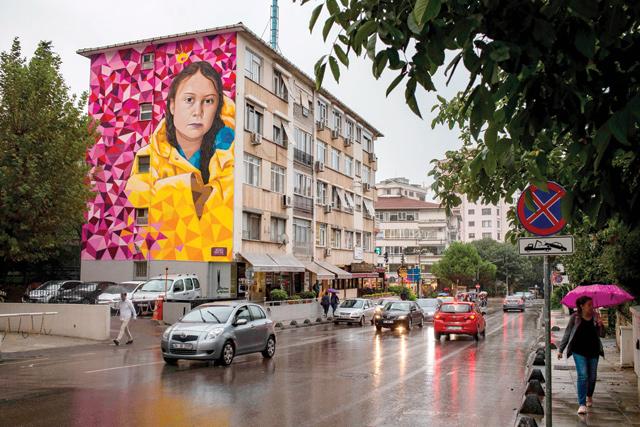You are here
‘Powerful’ Greta shames leaders: Cullis-Suzuki, child voice of 1992 Earth summit
By AFP - Sep 26,2019 - Last updated at Sep 26,2019

An environmentalist holds up a poster reading ‘How dare you’, quoting Swedish teenage climate activist Greta Thunberg, as she protests outside the German chancellery where is taking place the weekly cabinet meeting in Berlin, on Wednesday (AFP photo)
STOCKHOLM — At the 1992 Earth summit in Rio, 12-year-old Severn Cullis-Suzuki urged the world to save the planet. Now, the Canadian is a fervent supporter of Greta Thunberg, a "powerful" force who's holding world leaders to account.
"I'm only a child and I don't have all the solutions, but I want you to realise, neither do you!" Cullis-Suzuki told heads of state and government in the Brazilian city, adding: "If you don't know how to fix it, please stop breaking it!"
Twenty-seven years later, her words could be those of Greta, the young Swedish climate activist who took the podium at the UN on Monday and accused world leaders of having "stolen [her] dreams and [her] childhood with [their] empty promises", for the sake of "fairy tales of eternal economic growth".
Has anything changed in the years between Rio and New York?
"Why were the next decades the most destructive? It's about governance. Why do we do all these agreements, and not apply them?" asks Cullis-Suzuki in a phone interview with AFP.
She lives in Haida Gwaii, off British Columbia's coast where she lives with her husband, a member of the indigenous Haida community, and their two sons.
"Now we have climate change that very much affects everyone, and we don't have the time to wait another generation," the 39-year-old warns.
Cullis-Suzuki attributes the personal attacks on Greta Thunberg, a 16-year-old with Asperger's syndrome, to the fact that adults feel threatened by a child holding them accountable.
"She's powerful. She's shaming these leaders. And as she's calling for a revolution, of course she's getting pushback. They try to silence her," she says.
"She's a 16-year-old child who says: The emperor has no clothes."
"This young girl whom people are making fun of her appearance... I hope she has spiritual and personal support."
After Rio, Cullis-Suzuki joined the commission of the Earth Charter, an international declaration of fundamental values aimed at "building a just, sustainable, and peaceful global society in the 21st century".
She went on to study ecology, evolutionary biology and ethnobotany, and advised former UN secretary general Kofi Annan at the World Summit on Sustainable Development in Johannesburg in 2002.
'Destructive structures'
Cullis-Suzuki is the daughter of writer Tara Elizabeth Cullis and Canadian environmental activist David Suzuki known for his popular television programme "The Nature of Things".
Today, she is writing her doctoral dissertation on endangered languages, with a particular focus on that of the Haida people.
Cultural diversity and biodiversity are "parts of the same process", she says.
Indigenous communities everywhere have shown that they know how to "manage their ecosystem and resources", like the Kayapo people of Brazil's Amazon who are living "in the last line of defence before the bulldozers that are eating the planet".
Haida Gwaii, formerly known as the Queen Charlotte Islands, aims to phase out fossil fuels by 2023 — a bold goal for this 10,000-square-kilometre archipelago dubbed "Canada's Galapagos", which depends on diesel generators and has just one hydroelectricity plant.
Severn and her family live off of local products from farming, fishing and hunting. She also travels less than she used to.
"For years I've talked of individual actions but it can't be only up to individuals, because we all live in a big destructive structure," she says, adding: "Right now our economy has completely taken over our cultural values."
"We have to ask, does de-growth mean lesser quality of life? No."
Related Articles
STOCKHOLM — She is the icon of a young generation rising up against climate change.
NEW YORK — Beyonce is the most decorated artist in Grammys history, and her album releases have both triggered cultural earthquakes and resh
STOCKHOLM — Belarussian writer Svetlana Alexievich won the 2015 Nobel Literature Prize on Thursday, honoured for her work chronicling the ho


















